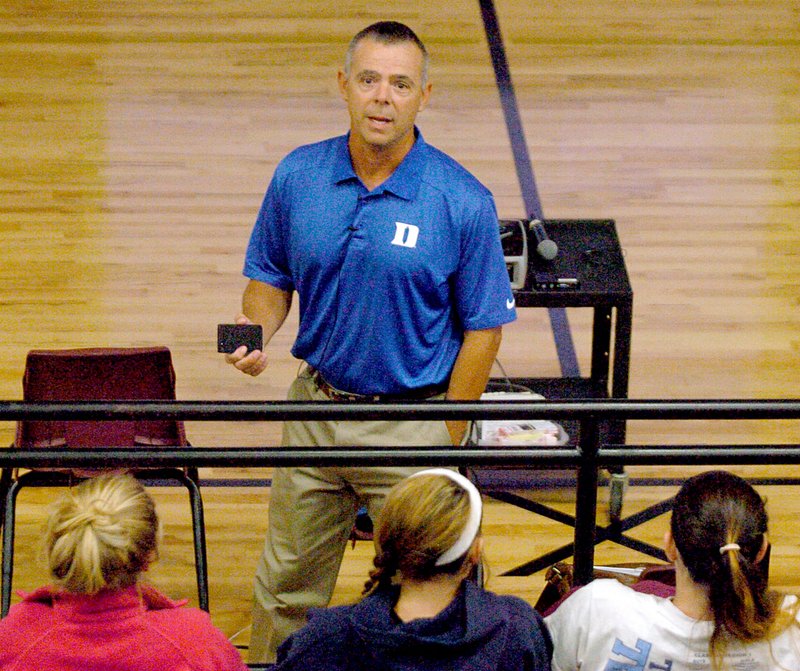LINCOLN -- An enraged father barges into the locker room after a boys basketball team suffered a season-ending defeat criticizing his son, a starting guard, over an alley-oop pass.
The father singled out one play gone awry as if his son had made a different decision at that juncture, the outcome, a 20-point loss, might have turned on a hinge.
Everybody in the locker room felt the young's man pain as he instantly burst into tears and wept uncontrollably -- humiliated in front of his coaches, teammates and press.
"I can never do enough to please him," the guard cried out.
Parental pressure to perform is the problem all too often in high school athletics, says Gregory Dale, professor of Sports Psychology and Sports Ethics at Duke University, speaking to a group of parents, coaches and athletes at the Lincoln High School gym on July 28.
"Parents, it's what happens behind closed doors is where most devastation occurs," Dale said. "Avoid making your kid talk to you right after it's over when it doesn't go well."
But this humiliation was public and blatant scarring a young athlete on the inside. The second-year head coach did the only thing he knew to do at the moment sending the father out of the locker room and wrapping a comforting arm around the sobbing teenager then prayed for healing to occur in the boy's wounded spirit.
This was a case of basketball's infamous triangle offense functioning in a very wrong, disturbing manner.
Dale described a triangle between coach, parent and kid.
"The kid always gets caught in the middle," Dale said. "Parents, when you are in the stands you should not be coaching your kid."
"Parents, your children are not screwing up on purpose. We ought to forget about that. Let's be honest," Dale said.
Dale said parental criticism of an athletic performance shouldn't happen, posing a direct question to parents.
"What message are you sending to your child if that's you?"
Dale said some fathers strategically place themselves in an athletic arena where their kid can see them and the kids are looking up into the stands trying to read their father when they should be focusing on the game.
"When they do that parents are doing more harm than good," Dale said.
Speaking directly to parents gathered for the presentation, Dale said, "Encourage them, cheer your kids on. If you coach them, they don't know whether they're coming or going."
Dale challenged parents, "Try to listen to two conversations at one time in your life when you're tired and there's pressure. You can't do that."
"Cheer on your kids. You need to stop coaching them from the sidelines," Dale said, explaining that the common issue of playing time is up to the coach and parents should leave those discussions off the table.
"Playing time is off-limits from middle school on. Don't talk to coaches about it, don't talk to your kids about it."
Dale then addressed student/athletes among the group.
"Kids, you need to tell your parents you have no control over your playing time."
Lincoln parent Deon Edwards attended and thought the gentleman who came from Duke University was very informative and really liked Dale's part of the session of what he felt was a community gathering to support Lincoln athletics.
In addition to their school activities, Edwards' daughters are active in rodeo, a highly competitive sport. He looks back to his own experience as a student/athlete very involved in athletics participating in football, wrestling and track and field.
Instead of having an overly-involved parent Edwards didn't have that much parental support.
"My mom very rarely came to any of my events so I like to be there for my kids but at the same time I kind of like for them to play the game."
Edwards prefers to let coaches coach and decide things like playing time.
"When I played you had to earn your spot on the team, it wasn't just given to you, so if my kid don't earn their spot it's usually pretty obvious as to why they're not on the field."
Lincoln assistant football coach Garrett Hammons liked the whole involvement for parents and making sports and athletic competitions about the kids instead of about them.
"I think if they make it about the kids; the coaches, the parents and the kids will have more enjoyable experience," Hammons said.
Lincoln softball and golf coach Karen Coleman also enjoyed the presentation.
"I think it was wonderful because it makes the kids and parents sit back and look at the whole program instead of the individual because it is a whole program. It's not just one kid and one set of parents, it's a whole program and we're all trying to work together."
Sports on 08/13/2014
